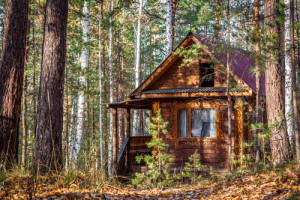
I dream of living off the grid! Via Shutterstock
One of my fantasies for saving money is to live off the grid. No electrical bills, no gas bill, no heating oil bill, no water bill! I day dream about collecting gray water, composting toilets, and harvesting rain water. What self-sufficient bliss! The problem is, I have no idea how to turn this money saving fantasy into reality.
Have you lived off the grid? How did you do it?
I’m gathering resources to learn more about self sufficiency and building a home that is as green as can be. Here are some of my questions.
How much does it cost to go off the grid? Obviously, the price varies hugely depending on whether you are retrofitting your existing home or building from scratch. You may have to buy land, or you may already own a corner of the world. But when people talk about building or buying homes, they often price it out by square foot. Should I expect to pay more or less per square foot than if I bought a similar sized, non-sufficent home?
Where do I start? I’m looking for a blog written by someone who went off the grid and who shares the lessons they learned and the mistakes they made. That way, the learning curve won’t be so steep. And perhaps I’ll avoid some pricey mistakes! Do you know of an off-the-grid blog?
What books should I read? One piece of advice I came across is to read books about going off the grid. How smart! And free! I’ve already required a handful of books from the library. Can you recommend a book about going off the grid?
Can we save money by retrofitting our current home? Another option that may well be simplier and cheaper is to retrofit our current home. What books and blogs do you recommend I read to learn about retrofitting our current home to take it off the grid?
Do we have to live in the middle of nowhere? I frequently – very frequently – see homes off the grid that are nestled in a beautiful patch of woods or surrounded by vast acres of undeveloped land. But what if I don’t want to live our in the boonies? What if I want to have neighbors (nearby)? Can we go off the grid in a city?
If we go off the grid, will we be shunned by our friends and family? One of my sisters already thinks we are old fashioned for using cloth diapers. This question is a little crazy – I know our real friends will support us – but I do think a lot of folks will have a hard time understanding our decision to go off the grid (if we do). How should we deal with skepticism?
Do you want to live off the grid?


I would love to live off the grid! Not sure I could convince my husband though… drats!
@Coupons Canada Maybe if you point out how much money it would save you…or have you already tried that? I’m guessing in a rural area it would be a big money saver, but I could be wrong. What’s tripping him up?
I live off the grid and it is not cheap. You have to buy solar equipment, diesel, etc. We don’t pay to the utilities but we still pay to live here. Internet is about $100 a month because we have to have satellite internet. We use a lot of fuel to go to town. The closest store is over 20 miles away.
@Bargnhtress How much more do you estimate living off the grid is? Are you in a location where living on the grid isn’t an option? Why did you go off the grid, if not to save money?
How often do you go to town? I can’t imagine living 20 miles outside of a town, but I guess you can get used to anything!
no that is not my dream.
Hahaha, it is not a dream for most people.
I live in the country…with electricity, but use a clothes line in the summer–primary source of heat is fuel oil, but also have a wood stove (but no free wood at this time, so, I have to buy it from someone) I did use cloth diapers for my children…there is a web site called Glad Rags, for reusable (washable) feminine pads…
I live in Amish country in OH…there’s a great store, Lehman’s Hardware, in Kidron, OH, that carries non-electric supplies…
Yes, I dream of living off the grid-if $ were no object, I would have an energy efficient, modest home built using geotherm heating, and the wood stove; solar panels for electricity; well & septic…
There are ways to make a difference–have a garden & can your food;
I have enjoyed a book called “Past Forward” by Chautona Havig–a novel about a family who lived on a totally sustainable farm! Keep researching!
@MS Barb Dawson Thanks for all these resources and strategies for what you do! Sounds like you’ve reduced your electricity use quite a bit. It’s amazing that if you retrofit your existing home or build a new home that is super energy efficient, you can get down to using just 10% of what a typical home consumes in energy. And if you buy solar panels or install a windmill, you can use as much electricity as you produce – net zero!
I have found a counter top “washer” –(to wash your clothes) & it does not use electricity–you hand crank it! There are places to buy treadle sewing machines in Holmes County (including Somewhere Sewing!)
@MS Barb Dawson Wow,that is taking it to another extreme. I’m not ready to give up my washer and dryer!
Do I want to live off the grid? In two words: absolutely not!
I have done more research on some items than others depending on what I have been looking into for my own home, or what I have done at work (Environmental Consultant).
LEED – Leadership in Energy and Environmental Design (LEED) has created a category for homes. This will be applicable if you are building a home. On average, LEED-certified homes use 20 to 30% less energy – with some homes reporting up to 60% less energy use – than a home built to code. LEED goes beyond energy and looks at other items such as sustainable siting, water, etc. http://www.usgbc.org/leed/rating-systems/homes
Geothermal – I have been looking into this for my own home as a possible replacement for my current HVAC, so the information here is related to retrofitting a current home. It is also possible to connect to a water heater. There are several types of geothermal systems, with most homes using horizontal closed loop because it is economical and typically does not require an environmental analysis prior to installation (look into codes in your area). A typical single family home requires 3,000 ft2 of land for a horizontal closed loop system, otherwise you can look into installing the more expensive vertical closed loop system (requires more drilling). You will need about 1,000 ft2 of land per ton of energy being produced (note this accounts only for heating/cooling, not other energy use). The cost is about $3,960 per ton of energy the system will be supporting. This gives up to a 60% reduction in energy use, has a 25 year life cycle, and requires minimal maintenance compared to a regular system. Some states (e.g. Maryland) offer incentives to install, and some electric companies offer rebates. Incentives will likely be less or greater depending on the energy intensity of your current system (e.g. oil, natural gas, electric). To find a qualified contractor, go to http://www.igshpa.okstate.edu/directory/search_location.asp
Solar panels – This is something that I will not be looking into for my home for another 10+ years because that is about the rest of the life span of my roof. Therefore, I have not really conducted much research. You would need to conduct an assessment to determine how much energy you could get from the location to see if installation would even be worth it. Also, this technology is changing so quickly and improving all the time that waiting may be worth it. As with geothermal, some states may offer incentives and some electric companies may offer rebates. If you produce a lot of energy, you can sell some of this back to the electric grid and actually make money.
Energy Audit – Before you retrofit anything with geothermal or solar you should have an energy audit conducted at your house to see if there is anything more economical that can be done to save energy. Some states (e.g. Maryland) have incentives to conduct this audit. We did this in our home and ended up installing new insulation and getting air duct sealing work. That, plus our nifty new thermostat (yes, the Nest is most definitely worth that initial investment) and low flow faucets/shower heads reduced our energy bill (all electric) by 20%. Some utilities offer rebates for this type of work.
Other – There are the obvious changes as well. EnergyStar appliances, unplug electronics when not in use, hang the clothes to dry, switch to CFL or LED bulbs (these have really come down in price lately), open and close shades at certain times of day depending on the season, do NOT close vents to unused rooms (common misconception), etc. I like hanging clothes to dry better because whenever I use the dryer the load sits around for several days and I pull stuff out of the basket when needed. With the drying rack I am forced to take clothes off and fold them in order to use it for the next load.
@Christine Thank you for sharing all you’ve learned from your extensive research! I’ve heard that Geothermal can be cost effective if you are building a home with a basement. Since you’ve already got that digging equipment out there, you can install geothermal tubes pretty easily. Did you know it’s possible to lay the tubes parallel to the surface instead of plunging them deep, deep into the earth? I believe they only have to be 10-15′ below ground to tap into consistent temperatures.
The cost of solar panels has dropped significantly in the past 10 years. It does make sense time them with the lifespan of your roof, and they can actually extend the life of your roof bc they add some protection from the elements. Some states offer big incentives and rebates for solar panels. Check the Dsireusa.org database.
I’m not quite sure if I’d like to live off the grid. I’ve always been a people person and I am used to living in the city. I’d love to vacation off the grid though!
One day I plan to own a self sustaining house off the grid that my family will live in. I look forward to having a huge garden full of fruits and vegetables!
Living off the grid is my life long goal! It will be nice to get away from shenanigans that come with city life. I don’t want to be too far off the grid though. I still want to be near a town or civilization of some sort.
Yes, I live off the grid! For over 18 years now and I love it. No, I am not in the middle of wilderness or anything like that. I am 6 miles from the closest small town, but centrally located to many cities (closes one is about 30 miles) and many other small towns with stores and businesses. We are surrounded by state forest on a dirt road, but not as secluded as people think you have to be to live off the grid. We have built our system little by little over the years, so it hasn’t cost that much money. Started small and built it a little bit by a time. DIY all the way. Our property is very small, about an acre but big enough for 11 raised beds. It is not expensive at all if you can find ways to get your firewood. I was cooking on a wood cook stove, but this year have started using electric for cooking with an Instant Pot and an induction cook top. It is free power since our system has become bigger. We have a solar refrigerator too so that is free also. I am glad so many people say they don’t want to live like this because it weeds out the ones who cannot handle it. During a power outage, I will still have power unless my system has been destroyed by whatever it was that caused it. As long as the sun continues to shine, the wind continues to blow, I will have free power.
That’s very impressive! Just curious: do you have cell reception where you live?
Yes, we do. In fact we even have DSL now. In our area there is a number of cell towers.